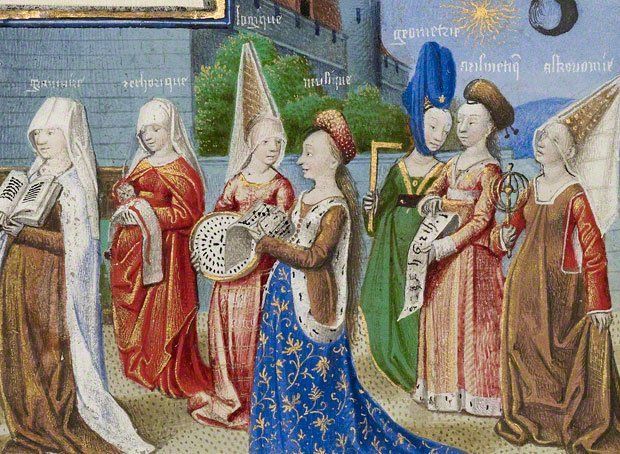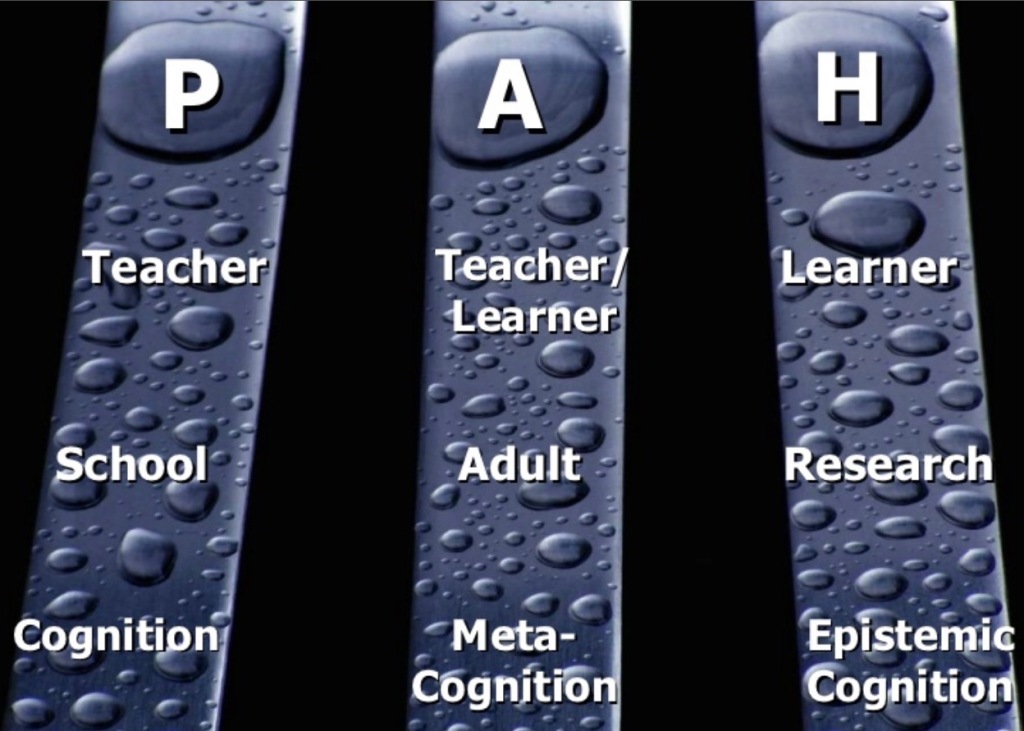My friend Jack eats Heutagogy
Sheep and Schopenhauer
“Know no future, fear no past” so singing Jack Hues solves Schopenhauer’s Conundrum; for sheep. Being creative entails addressing the dialogical problems the future sets for us when “history will teach us nothing”. Meanwhile education is a system of bullying and grooming that farcically forces us to look ONLY at the past whilst the unrevealed future always arrives in a multiplicity of ever baffling ways. We’ve trained and instructed ourselves as a species not to be context-responsive; curiously so because that was how evolution shaped us. Yet making music can force us to address our multitudes afresh as it’s about developing our interactive capabilities viscerally. We sing the body collective.
Failed Musicians: Twenty years ago I chaired my first research seminar on informal e-learning at the RSA in London. In my opening remarks I casually mentioned that the best people in (digital research ) were all failed musicians; the next four speakers all revealed that they had started as musicians. I had even moved down here to London to become a musician. Circumstances lead me to becoming an editor, an activist and a self-determined learner instead. The long and winding path of curiosity. My favourite drummers didn’t have such luxury of choice so they became self-directed musicians, especially in the Analogue Revolution of the Sixties. What we putative musicians had learnt was play, listening, failure, resilience and how to continually reframe our thinking as necessary.
This is your brain on music: as we’ve decided socially, since the Enlightenment, to value “Culture” hierarchically, we’ve also placed musicians and their formalised modes of expression at the top of (our) classically historic value-tree. However Daniel Levitin reveals that, neurologically, we learnt to sing together first, as our original means of sharing (conscious) communications and everyday language, and the grammars that subsequently emerged. Singing was the original way in which we shaped our collective futures. Playground hopping and skipping, and their attendant rhyming and singing, are ways children emerge into listening and conversing socially; jumping not so much. As Mark Nagel similarly points out in Wired for Culture we humans have evolved a culture for transmitting what we’ve learnt together about ourselves and our overlapping environments. Culture exists first of all to help us become aware of, and know ourselves as points on a wavy curve.
Singing ourselves into being; whilst the research neuroscientist Levitin pragmatically demonstrates our evolutionary social history of communicating he also has a radically different speculative vision of how that emerged socially. He believes all societies sang themselves into being with Six Songs; friendship, joy, comfort, religion, knowledge, and love. We collaborated culturally to allow the social lineaments by which we might live to emerge. Without these songs we can’t build society anew. What Levitin suggests is that we musically shape our founding myths and their attendant futures. Currently however we are plagued by Flags and national anthems designed to reinforce the origin stories of our, globalised, nation-states. Despite Thomas Dolby’s “Windpower” we’ve haven’t yet sung into being the necessary origin myths of an original ecological society.
The Liberal Art of Music: in my long search for useful models with which we might replace our cruel and bloody usual education systems (and now death by OFSTED) I’ve delighted in the Liberal Arts curriculum of the Medieval University. A learning process whereby they place development of the practical skills of arts and crafts ahead of the taxonomy of subject “mastery” held back to post-graduate study; hence Masters degrees. Delightfully music was then seen as a fundamental skill with which to become an educated person. Developing a range of skills for communicating and collaborating with our peers was, back then, at the heart of organised education.
Public Skills not Private Skills; the three liberal language arts of grammar, rhetoric, and dialectic, and the four number arts of music, arithmetic, geometry, and astronomy. were put in place to develop someone who could contribute publicly. The original Academy of Plato was a place of public discourse amongst a community of scholars who, collaboratively made sense of the ideas of wise men.

And then Charles II chartered science into existence replacing discursive natural philosophy with the deceitful hierarchical certainties of taxonomy (1660) of the Royal Society. The ‘scientific method’ has allowed untrammelled egos to rule our mental domains ever since, arguing that all you need is knowledge until Nobel Prize winners blew away our abilities to think for ourselves. Ever after we sidelined and denigrated friendship, joy and comfort. Original thought requires a multiplicity of metaphors to draw upon to stimulate our creativity and the advent of science and the scientific method has created the current monoculture of thoughtlessness that renders us stupefied in the face of existential threats. Great men no longer have the answer(s)…

Creating Creativity Culturally: since we’ve learnt to decry culture as our social way of being, lionising instead Culture as a hierarchical system of economic rewards, especially if you “own” with its attendant curation of value, we’re left with the farce. The chant of the ever-circling skeletal art-form. Whereas as a species we are naturally creative when our culture is based on the play of mutuality. And creativity is sourced through the open play of ourselves with each other. As kids of my generation used to say “let’s go out and play” in our co-created gardens of playful delights where we create fresh metaphors meaningful just to us.
All You Need is Heutagogy: having co-created an academic model of how we might learn (the open context model of learning) based on rethinking how we might teach, I then decided to create a description which could be understood by almost everyone. After creating a novelisation of the theory (63/68 A Visceral History) a fellow researcher at Oxford University (Russell Francis) challenged me to do this with The Beatles. Amazingly my PAH formulation helped reveal patterns in the Beatles development as recording artists. Pedagogy the period when, as recording artists producer George Martin showed them how to turn their Merseybeat songs into Hit records. Andragogy when their new-found recording confidence enabled them to listen to and discuss with fellow musicians. Heutagogy when their recording Mastery enabled them to treat the recording studio itself as a musical instrument reframing how everyone thought about popular music.
Remake/Remodel: the single best book on the Heutagogy of Music, and much else besides, is Michael Bracewell’s book on Roxy Music originally called Remake/Remodel; Roxy don’t even make an appearance until 200 pages in. These initial pages however discuss ART School education from 1945 to 1970, when Roxy Music got it together. Notably the concept of a Foundation Year when all putative artists try out a range of crafts beyond that skill that had earned them a place at college. So creating a wider set of frames for their art. The music group Pulp’s most famous song Common People was written by Jarvis Cocker after he took such an optional class in sculpture at St Martins College of Arts (where the Sex Pistols played their first gig) and met “she came from Greece”
10,000 hours on the Violin; in The Craftsman Richard Sennett puts forward the idea that a craft understanding of a tool, in his case playing the violin, takes 10,000 hours. After which, he argues, you can switch from going deep to going wide. With which you might be able to move from knowledge to wisdom, as we sometimes see, and hear, in great art. As an Emeritus Professor Sennett is also, as I describe it, a “failed musician” who has written, with depth and insight, into what he learnt whilst playing music. My interpretation of that it is the practical play that our curious relationship to art affords us that enables us to develop an enduring creativity. The wellspring from which we can reframe how we might live. And I agree with Levitin that music, singing together, is where we might start…
Everything is a Song; as Jack sings his resonant metaphor “know no future, fear no past” he prompts us in three dimensions of time to ruminate slowly and thoughtfully; remember the past, engage with the present, create the future. If you personally wish to affect the future then you need a wide-ranging knowledge of the past filtered by contemporary concerns. We don’t face a planetary existential crisis currently, we face an epistemological crisis. Unwisely we have locked up access to useful knowledge in ivory towers and now asks scientists to joylessly explain us to ourselves! We need to sing into being new, transformative, metaphors if we wish to sing into being the society that pleases us most…
Why the Heutagogy of Music? Because if we allow music back into schools then the creativity of engaging in the arts will help transform how we engage with everything beyond the deadly hallows of our exam-based education systems, which merely train us to be dissatisfied warriors of extraction rather than satisfied collaborators of many and mutual distinctions…
PAH; If, as I suggest, education requires subject-based teaching (Pedagogy), discussions and conversations about what we’ve just heard or are interested in (Andragogy), as well as the creative stimulation of solving problems (Heutagogy) then these varying cognitions need various modes of stimulation. Teaching can stimulate our cognition, conversation can stimulate our meta-cognition but our epistemic cognition needs more. To reframe our thinking we need to be able draw upon a wide range of metaphors so we may move criteria across contexts as Giles Lane describes how we might think afresh.
As Jude Rogers put it; I learned that music can be a starting point on a much broader cultural adventure, taking in the interests, heritage and history of people.
When I first heard The Beatles (other musical excitements, of your choice, are available) I was excited, thrilled by the sound I heard and responded viscerally to what my ears revealed to me. As I followed their Songlines through my time in secondary school (Ballad of John & Yoko was toppermost of the poppermost when I sat my last exam) they revealed the many lines of desire by which I might live my adult life. When I needed comfort they brought me joy. When I needed knowledge they brought me love. When we seemed at war they counted me in and gave me the religion of music… I am he as you are me as we are altogether
Notes (WIP) 1) Academics steal the ground on which we think 2) We’ve become a self-stupefying species 3) Creativity is fragmentation (fragmentation is creativity) 4) as the Stones said; why don’t we sing together (see what happens)










